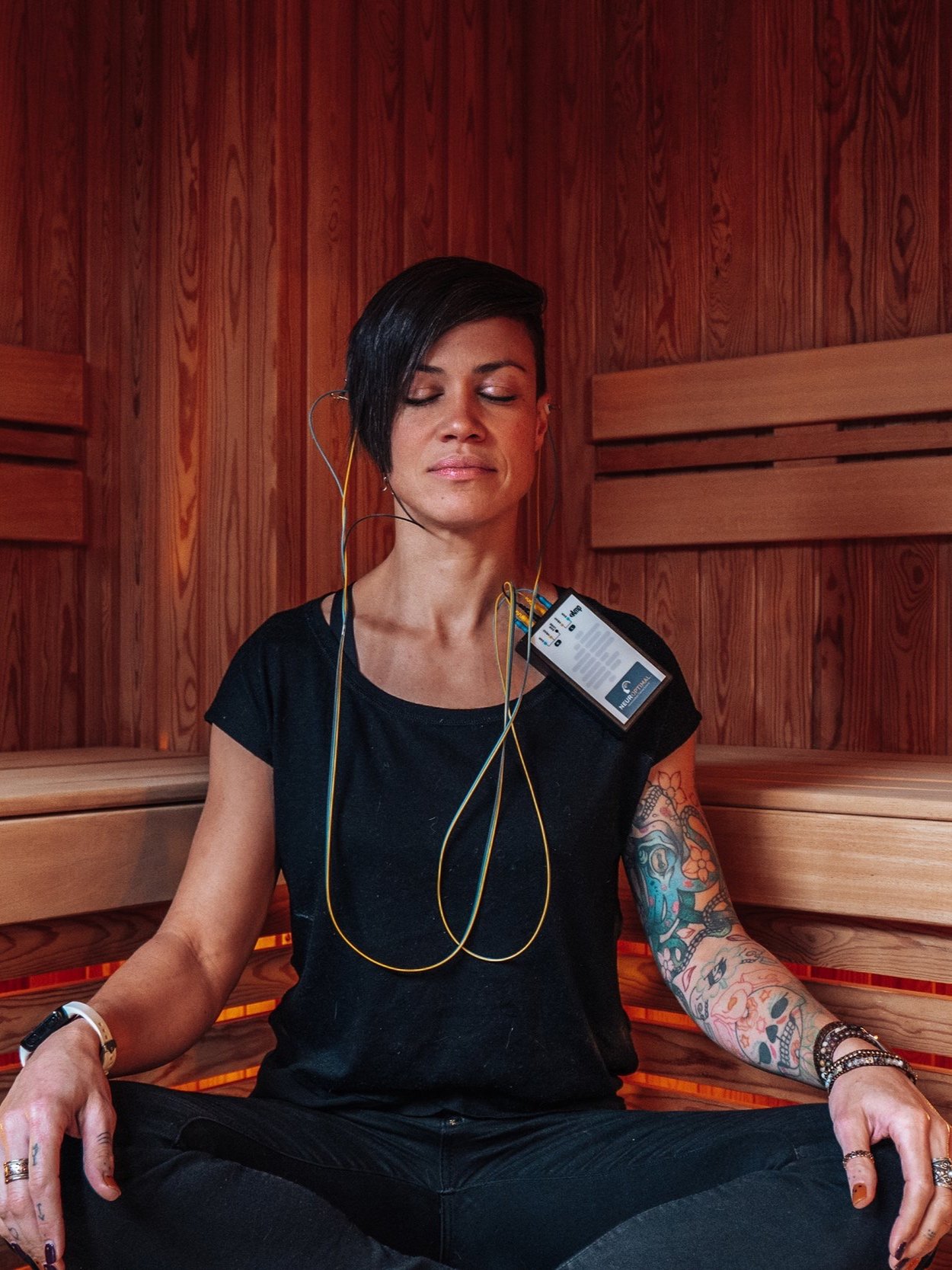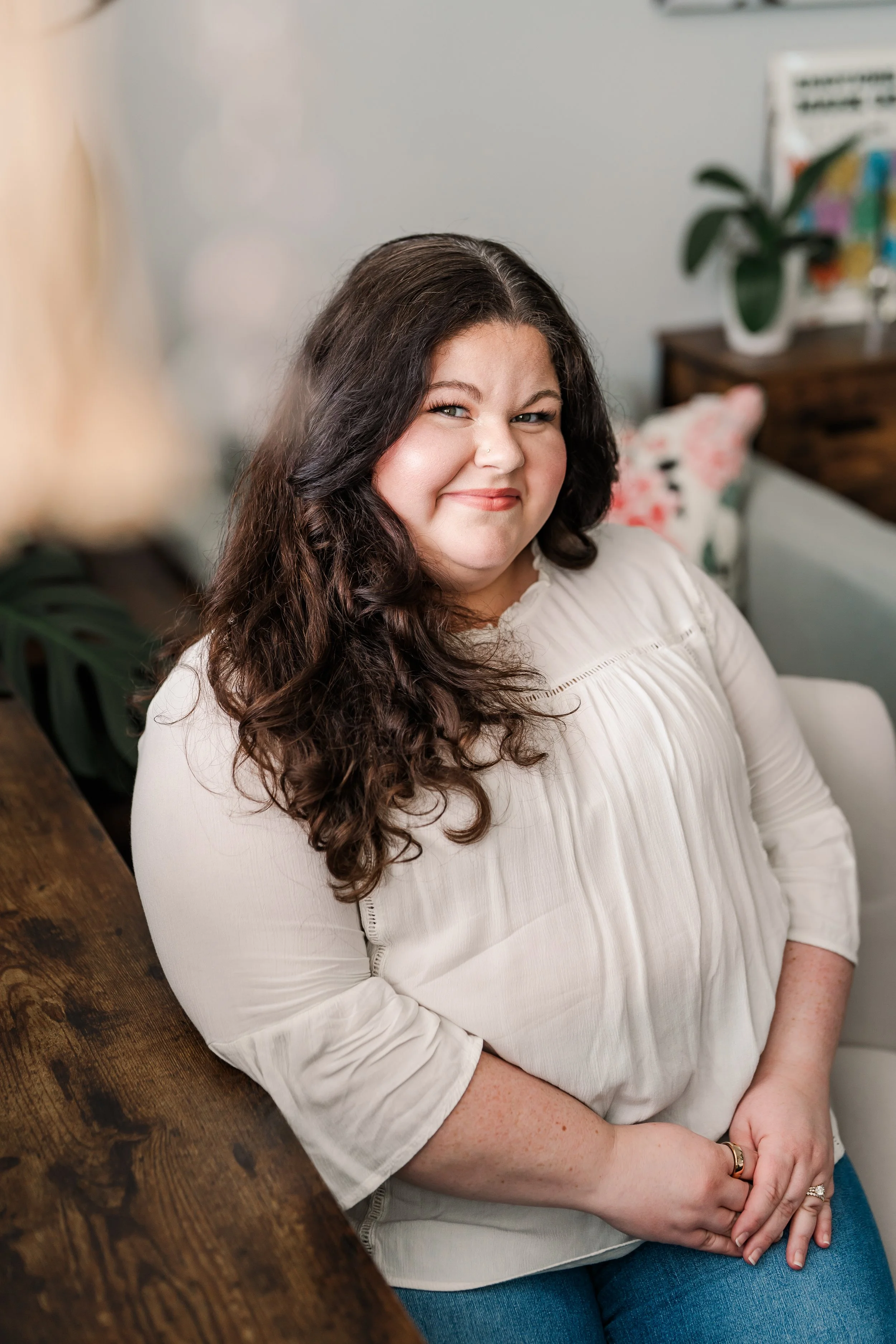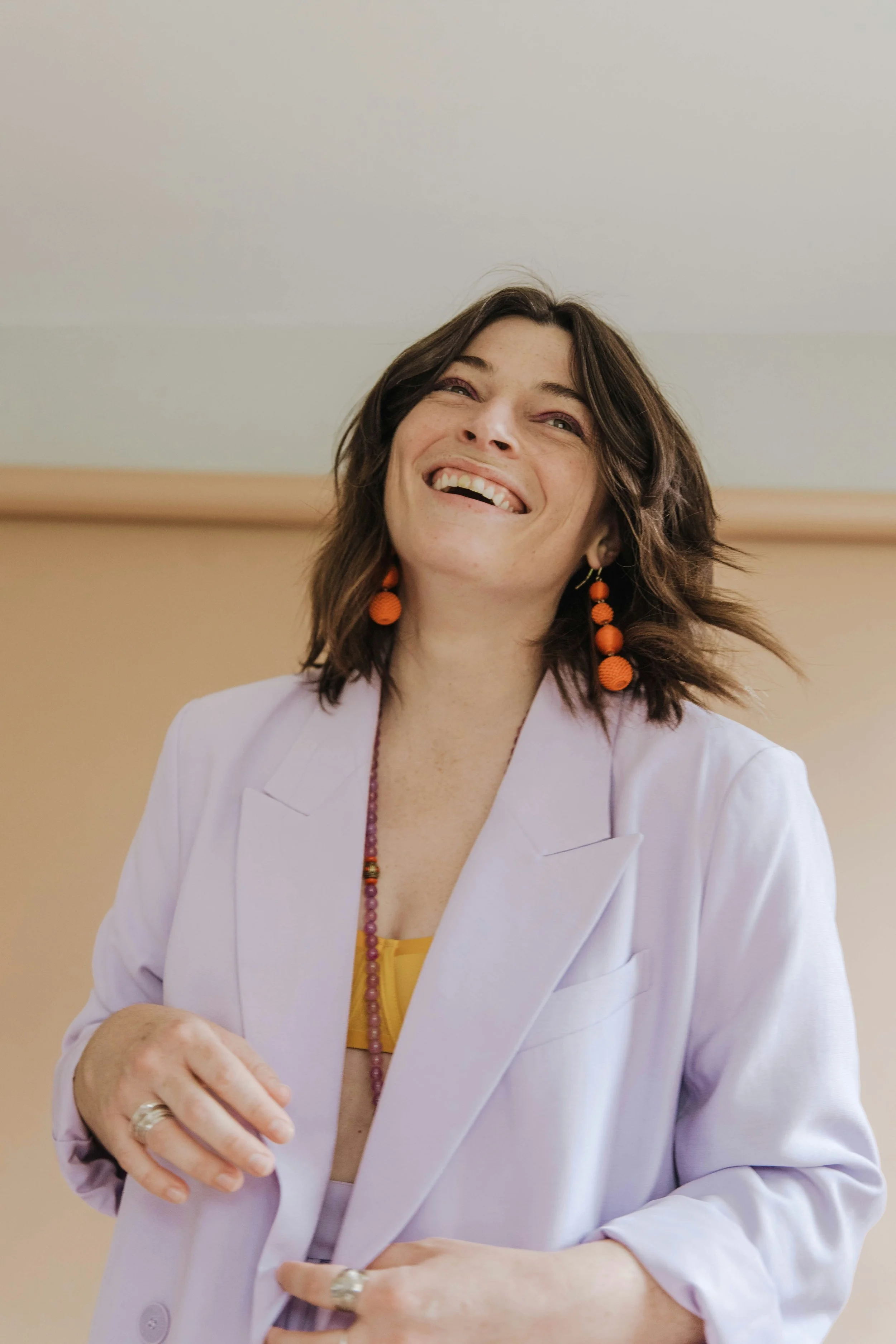Customized therapy for women ready to heal what’s beneath the burnout, perfectionism, and people-pleasing.
You’ve spent years holding it all together, and it’s your turn to be supported now.
Trauma & Intensive Therapy for Women in Ooltewah, TN
& online throughout Tennessee, Colorado, & Florida
I’m so glad you’ve found your way here.
You’ve always been the capable one — the one people count on.
At work, you get things done. At home, you hold everything together.
You anticipate needs before they’re spoken. You keep the peace. You keep it together.
But lately, it feels like you’re running on fumes.
You’re exhausted, anxious, and stretched too thin.
You replay conversations in your head, apologize for taking up space, and keep wondering why you still feel like something’s wrong when you’ve done everything “right.”
You’re tired of carrying the mental load for everyone around you.
You want to rest, but your brain doesn’t know how to stop.
You care deeply, but sometimes that means you forget yourself.
You’re smart, insightful, maybe even the “therapist friend.”
You’ve read the books, listened to the podcasts, and done the work.
But what no one sees is how hard you’re trying to keep it all from falling apart.
You might have a hunch that your brain works differently — maybe ADHD, maybe autism — and that’s shaped how you’ve learned to survive.
Or maybe you grew up in a home or religion that taught you to earn love by being good, quiet, or useful.
Maybe you’ve learned to mask so well that even the people closest to you have no idea how hard it is to hold it all.
Now you’re realizing that survival mode has an expiration date.
You’re ready to stop people-pleasing, stop apologizing for existing, and start understanding yourself in a way that feels like freedom.
Therapy with me isn’t one-size-fits-all. It’s flexible, creative, and deeply customized to how your mind and nervous system work.
You don’t need to fit a mold — we’ll build something that fits you.
This isn’t one-size-fits-all therapy.
It’s deeply personalized, trauma-informed, and neurodivergent-affirming care for women who’ve tried everything and are ready for something that actually works.
Together, we’ll:
untangle the beliefs that keep you stuck in over-functioning, guilt, and self-doubt.
learn how your brain and body respond to stress, burnout, and trauma.
build systems and boundaries that actually fit your life.
reconnect you to the parts of yourself you had to leave behind to survive.
We’ll use flexible, evidence-based methods like Brainspotting, Accelerated Resolution Therapy (ART), and Neurofeedback — approaches designed to help your nervous system heal at the root, not just talk about the surface symptoms.
And because you deserve therapy that adapts to you, I offer both weekly or biweekly sessions and therapy intensives that work around your life, not against it.
"When we deny our stories, they define us. When we own our stories, we get to write a brave new ending.” -Brené Brown
For years, you’ve worked hard to show up perfectly for everyone else—at work, in relationships, in family roles. But inside, it feels like you’re always one misstep away from falling apart.
You replay conversations, wondering what you should have said differently.
You feel like you’re on stage, constantly performing to keep others happy.
You find yourself repeating the same hurtful relationship patterns.
You worry something’s wrong with you—that no one truly sees how hard you’re struggling.
Whether it’s the weight of childhood trauma, the lingering impact of relationship abuse, the confusion after leaving a high-control religious environment, or the exhaustion of trying to navigate life as a neurodivergent woman in a world that doesn’t always make room for you—there’s a common thread:
You want to feel safe, confident, and connected—without the constant fear, doubt, and overthinking.
Hi, I’m Jacqueline.
Therapist. Overthinker. Recovering perfectionist.
We’ll build something that fits your pace, your wiring, and your real life — whether that’s traditional weekly therapy or immersive therapy intensives that help you make deep progress faster.
I’m not a “stuffy, sit-back-and-nod” therapist. I also won’t just validate you without giving you the tools to grow. Validation is important, yes—but I believe therapy should be more. In sessions with me, I will:
Challenge you and call you out (with compassion).
Teach you skills and strategies that actually stick.
Help you explore the uncomfortable topics—trauma, sex, money, power, privilege, identity—without judgment.
Use humor when needed, because sometimes laughter is the only way to open the door to the hard stuff.
I show up as my authentic self because I know trust, safety, and connection are the foundation of healing.
I also bring a special focus in working with neurodivergent clients, LGBTQIA+ clients, and survivors of high-control religious systems, alongside women healing from trauma in relationships, families, and careers.
My approach is built for women who…
are insightful and self-aware but still feel stuck
have done the work before and need something that actually clicks
want therapy that’s high-touch, individualized, and efficient
crave emotional depth and nervous system healing — not surface-level advice
Because healing shouldn’t feel like another thing you have to perform.
It should feel like coming home to yourself.
Someone who understands what it’s like to look “fine” while quietly falling apart.
I’m a trauma and neurodivergence-informed therapist who helps high-achieving women heal what’s underneath the burnout, people-pleasing, and self-doubt.
I built Wild Oaks Counseling for women who’ve spent their lives earning love through effort — the ones who show up, hold it all together, and rarely feel seen for the full, complicated humans they are.
In therapy, I combine trauma-focused, body-based modalities like Brainspotting, Accelerated Resolution Therapy (ART), and Neurofeedback with a warm, relational approach that’s deeply attuned to how your brain and nervous system work.
This isn’t about “coping better.” It’s about learning to exist differently — with more safety, freedom, and self-trust.
I believe therapy should feel customized, not clinical.
You don’t need another worksheet or “just think positive” plan.
You need someone who can see what’s beneath the symptoms — the trauma, the masking, the relentless self-pressure — and help you untangle it with compassion, not judgment.
My approach is integrative and fully customized to your story.
This is therapy for women who want transformation, not checklists.
You’ll feel at home here if you:
look high-functioning on the outside but feel like you’re quietly unraveling inside
are exhausted from earning love through doing, fixing, and giving
crave rest but can’t stop the mental to-do list
are deconstructing old beliefs about yourself, your faith, or your worth
are beginning to understand your ADHD, autism, or experience in a new light
want healthier, more reciprocal relationships — without losing yourself in them
are ready to stop performing strength and start practicing self-trust
Therapy isn’t about fixing you — it’s about helping you finally see yourself clearly.
You’ve spent your life being everything for everyone else.
Now it’s your turn to be known, supported, and free.
Two Formats to Work Together
Customized therapy for women ready to stop over-functioning and start healing for real.
You’ve spent years holding everything together — the career, the relationships, the invisible mental load — all while quietly wondering when it would finally feel easier. My services are designed to meet you where you are and help you heal beneath the burnout, anxiety, and perfectionism that have been running the show.
Whether you prefer steady, ongoing support or an immersive intensive experience, you’ll find a path designed specifically for your goals and your pace.
Ongoing Therapy for Steady Growth
Personalized ongoing sessions designed to help you understand yourself, untangle long-standing patterns, and create sustainable change.
For women who want a consistent space to process anxiety, burnout, people-pleasing, and past experiences while learning practical tools to feel grounded and connected again — providing consistent support along the way.
This is ideal if you’re seeking deeper self-understanding, emotional regulation, and support through life’s ongoing challenges.
Therapy Intensives for Accelerated Healing
Deep, focused sessions that condense months of progress into one transformative experience, over 1-3 days, customized to you and your needs.
For women who are ready to dive in, get to the root, and move forward faster. Intensives allow uninterrupted time to process trauma, reset nervous system patterns, and find clarity — all within a fully customized format that fits your life.
This is ideal if you’re seeking faster relief, more flexibility, or an immersive experience that helps you feel different, not just think differently.
How We’ll Work Together
Healing doesn’t have to mean starting over — it means finally understanding why you feel the way you do and learning how to shift it.
My approach combines trauma-informed, neurodivergence-affirming therapy with body-based and relational methods designed to help you feel safe, grounded, and clear.
I integrate modalities like Accelerated Resolution Therapy (ART) and Brainspotting for fast, gentle trauma processing, Neurofeedback to help your brain find balance and calm, and the Enneagram to uncover the deeper motivations driving your patterns.
You’ll also experience a thoughtful blend of acceptance and commitment therapy, compassion-focused therapy, and attachment-based, feminist, and relational approaches — because healing is never one-size-fits-all.
This customized framework helps high-achieving, deeply feeling women heal beneath the burnout, perfectionism, and people-pleasing.
Together, we’ll work to create lasting change in the areas that matter most to you — whether that’s finding peace in your nervous system, confidence in your boundaries, or freedom from cycles of guilt, exhaustion, or self-doubt.
-

Accelerated Resolution Therapy (ART)
ART uses gentle eye movements and visualization to help your brain release stored trauma quickly and effectively. Many clients notice significant relief in just 1–3 sessions, making it a powerful tool for resolving painful memories and shifting negative beliefs.
-

Brainspotting (BSP)
Brainspotting uses the connection between your gaze and your nervous system to access and heal trauma at a deep level. By focusing on specific eye positions, your brain and body are able to process unresolved experiences in a way that feels natural and profound.
-

Neurofeedback
Neurofeedback helps retrain your brain to regulate itself. By receiving real-time feedback, your brain learns to spend more time in calm, focused, and balanced states—so regulation becomes your default rather than the exception.
-

Enneagram
The Enneagram is an insightful framework for understanding your core motivations, fears, and adaptations. It can help you recognize patterns that no longer serve you, deepen self-awareness, and create more authentic connections with others.
My Specialties
I specialize in helping women navigate:
Burnout, anxiety, and chronic overwhelm
People-pleasing, perfectionism, and imposter syndrome
Religious trauma and recovery from high-control environments
Relationship trauma and emotional abuse recovery
Boundaries and self-worth in relationships
ADHD, autism, and late-identified neurodivergence
Reconnecting with rest, joy, and authenticity after years of survival mode
Every service is personalized — from individual therapy for steady growth to intensive therapy experiences that accelerate healing and create real relief.
Therapy for Women
Customized, trauma-informed therapy for high-achieving women who appear strong on the outside but feel stuck, anxious, or exhausted inside. Learn to quiet the inner critic, reconnect with yourself, and build a life that actually feels good.
Self-Esteem & Perfectionism
You’re holding it all together, but at a cost. Therapy can help you calm the constant mental noise, ease overwhelm, and find balance between ambition and rest so you can actually enjoy the life you’ve built.
ADHD & Autism in Women
Whether you’re still in it or healing from it, you don’t have to carry the confusion and self-blame anymore. We’ll rebuild your sense of self, strengthen your boundaries, and help you trust your own voice again.
Religious Trauma
Customized, trauma-informed therapy for high-achieving women who appear strong on the outside but feel stuck, anxious, or exhausted inside. Learn to quiet the inner critic, reconnect with yourself, and build a life that actually feels good.
People-Pleasing & Boundaries
You’ve spent years chasing “good enough” and still feel like you’re falling short. Therapy helps you break free from the endless striving, reconnect to your worth, and move through life with more ease and confidence.
Childhood Trauma
Discover what it means to live authentically as a neurodivergent woman. We’ll explore identity, self-acceptance, and practical tools to help your brain—and your life—work with you, not against you.
Burnout & Anxiety
Heal from the confusion, guilt, and self-doubt left by high-control or authoritarian religious systems. Together, we’ll untangle what was faith from what was fear—and help you reclaim your voice, identity, and belonging.
Emotional Abuse & Toxic Relationships
You take care of everyone else—often at your own expense. Learn to set boundaries without guilt, speak your needs clearly, and build relationships that feel mutual, respectful, and real.
Therapy Intensives
You’ve outgrown the circumstances that hurt you, but your body and mind may still be living in them. Therapy helps you release old patterns, reparent yourself with compassion, and finally feel safe in your own life.
Therapy Options - Frequency & Location
-
For ongoing struggles or consistent support, weekly or biweekly sessions help you build steady progress. Perfect for women who want to dig deep into trauma therapy, boundaries, or relational healing at a sustainable pace.
-
For those needing faster, focused support, therapy intensives allow for 3+ hours of deep trauma work across 1–3 days. Intensives are powerful for processing childhood trauma, religious trauma, relationship abuse, or breaking stuck relational cycles.
-
Available for clients in Tennessee, Colorado, and Florida. Meet from home, work, or wherever you feel comfortable. Online trauma therapy makes healing more accessible and flexible.
-
Located in Ooltewah, TN (minutes from Chattanooga and North Georgia), my office offers a confidential, grounding space separate from your daily life. In-person sessions are ideal if you value having a physical retreat for vulnerability and growth.
Getting Started is Simple
Reach Out – Complete a consultation form and schedule a free 20-minute phone chat to see if we’re a good fit.
Commit to the Process – Therapy works best when you approach the process open and willing to do the work. We’ll adapt the process to your needs and pace.
Feel Secure, Confident, and Connected – Therapy helps you trust yourself, strengthen relationships, and finally feel safe in your own story.
Take the First Step Toward Healing
You don’t have to keep carrying this weight alone. Whether you choose weekly sessions or a trauma therapy intensive, you can begin to feel safe in your body, confident in your relationships, and free in your life.
FAQs
Q: What types of clients do you work with?
I specialize in working with women who are insightful, growth-minded, and motivated to heal. Many of my clients are high-achieving women struggling with childhood or relationship trauma, survivors of high-control religion, and women navigating trauma tied to neurodivergence.
Q: Do you offer both weekly therapy and intensives?
Yes. I provide traditional weekly or biweekly therapy for ongoing support, as well as therapy intensives for women who want faster, deeper work. Intensives are especially effective for trauma processing, religious trauma, and relationship healing.
Q: Do you offer online trauma therapy?
Yes. I offer secure telehealth sessions for clients in Tennessee, Colorado, and Florida. Online trauma therapy is just as effective as in-person therapy and allows you to meet from your home, office, or other safe space.
Q: What therapy approaches do you use?
I integrate relational therapy with trauma-focused, body-based methods like Brainspotting and Accelerated Resolution Therapy (ART). These approaches help the nervous system release trauma so you can feel safe, confident, and connected again.
Q: Where is your office located for in-person sessions?
My office is in Ooltewah, TN, minutes from Chattanooga and North Georgia. It’s a welcoming, confidential space where you can step away from daily life and focus on your healing.
Q: How do I get started?
Start by filling out the consultation form. Then we’ll schedule a free 20-minute phone chat to make sure we’re a good fit. If we’re not, I’ll provide referrals to someone who may better meet your needs.








